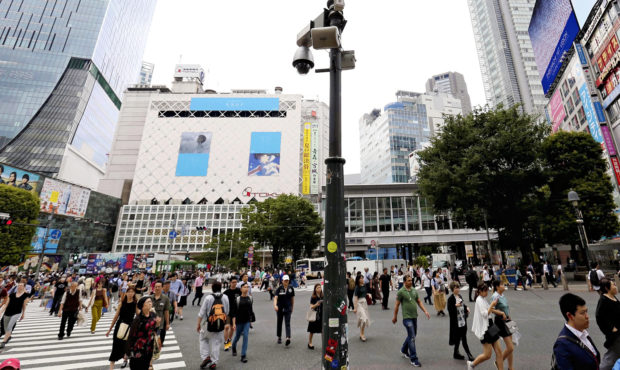Expansion of security cameras behind drop in Japan crime figures

People walk under a security camera in the Shibuya district of Tokyo on July 18. The Japan News/Asia News Network
TOKYO — The number of criminal cases confirmed by police in the first half of this year marked the 17th consecutive year of decline, thanks largely to the widespread installation of security cameras around Japan, according to National Police Agency data.
Security cameras, especially in urban areas, have become a major tool for investigations and are a deterrent to street crime, because they are a constant reminder that crime doesn’t pay. Improved security devices on the market now for cars and motorcycles have also contributed to a decrease in theft cases.
Analyzing video footage taken by security cameras and drive recorders led to identifying suspects in 9,211 cases in the first half of this year, according to the NPA, accounting for 9.9 percent of all cases in which suspects had been arrested, excluding additional crimes committed by the same suspects and other cases. A breakdown reveals especially large percentages for street crimes: 32.5 percent for bag snatchers, 22.0 percent for pickpockets and 19.6 percent for burglaries.
As there were only 1,912 security cameras installed by the police in 30 prefectures as of the end of March, major contributors to investigations are private and local government security cameras.
In Tokyo, more than 17,000 security cameras had been installed as of the end of 2017. When an incident occurs, investigators ask the installer for cooperation and copy the image data to memory devices. Then, the Metropolitan Police Department will analyze the images in special departments such as the Investigation Support and Analysis Center. When young revelers celebrating Halloween caused a disturbance in the Shibuya district of Tokyo last October, the police collected footage from about 250 security cameras and were able to identify 15 suspects among the crowd.
Article continues after this advertisementTracing offenders based on multiple security camera images is called the “relay method,” which has led to arrests in such cases as a series of robberies committed after “appointment phone calls” in Tokyo.
Article continues after this advertisement“Security cameras are an indispensable tool,” an investigator said. “They can have a psychological influence on potential criminals, giving them a moment of hesitation, which is often enough to prevent the crime.”
On the other hand, modern anti-theft equipment has also proven effective for reducing the number of thefts of cars and motorcycles.
Anti-theft car alarm systems have been selling well recently, according to Naokatsu Chino, a car life adviser at A Pit Autobacs Shinonome in Koto Ward, Tokyo. These systems sound a loud alarm when a door is irregularly opened or the engine is started.
Criminal groups have recently used a new method of stealing cars called a “relay attack,” in which they intercept the signal from a nearby electronic key fob and relay it to the vehicle.
The store where Chino works sells special key cases that neutralize relay attacks, preventing the electronic signals from leaking out from the key fob. Some products are so popular that they cannot keep them in stock, according to the store.
A popular theft-prevention item for motorcycles is a high-strength chain lock that cannot be easily cut. The chain can be locked around something like a sturdy pillar at a parking lot to prevent the bike from being stolen. Alarm systems that detect vibrations when a thief tries to steal a motorcycle and sound an alarm are also selling well, according to the store.